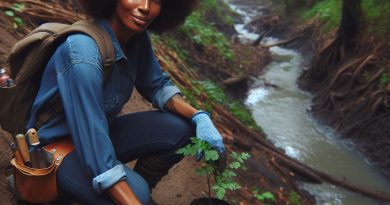Conservation Science: Job Outlook
Last Updated on January 28, 2024
Introduction
Let’s explore Conservation Science: Job Outlook.
Conservation science plays a vital role in tackling environmental problems and preserving the natural world.
It is crucial to discuss the job outlook for individuals interested in this field to understand career prospects.
Briefly introduce the topic of conservation science and its importance in addressing environmental issues
The field of conservation science focuses on understanding and protecting the environment, biodiversity, and ecosystems.
It encompasses various disciplines, such as ecology, biology, and environmental science, to address the challenges facing our planet.
The importance of conservation science in addressing environmental issues cannot be overstated.
It helps in identifying and documenting threats to natural resources, developing strategies for sustainable land and resource management, and promoting conservation practices at both local and global levels.
Understanding the job outlook for conservation science is essential for individuals considering a career in this field.
With increasing awareness of environmental issues and the need for sustainable practices, there is a growing demand for professionals in conservation science.
The relevance of discussing the job outlook for those interested in pursuing a career in this field
Job opportunities can be found in various sectors, including government agencies, non-profit organizations, research institutions, and consulting firms.
Positions may involve conducting field research, developing conservation plans, implementing restoration projects, and advocating for environmental policies.
The job market for conservation scientists is competitive but promising. Individuals with specialized knowledge, skills, and experience in areas such as data analysis, GIS mapping, and policy development have better prospects for employment and advancement.
It is crucial for aspiring conservation scientists to stay updated with advancements in technology, research findings, and policy changes.
Networking, gaining practical field experience, and pursuing advanced degrees can also enhance job prospects.
Therefore, conservation science is essential for addressing environmental challenges, and discussing the job outlook provides valuable insights for those interested in pursuing a career in this field.
It is an exciting and rewarding field with growing opportunities for individuals passionate about protecting our natural resources.
What is Conservation Science?
Define conservation science and its objective
Conservation science plays a crucial role in preserving and protecting natural resources.
This interdisciplinary field focuses on understanding and finding solutions to environmental issues.
Conservation scientists work towards sustainable development and the long-term survival of ecosystems.
Conservation science is the study of preserving and managing natural resources to maintain ecological balance.
Its objective is to minimize human impact on the environment and ensure the sustainable use of resources for future generations.
Conservation scientists analyze the impact of human activities on land, water, and air.
They develop strategies to protect biodiversity, restore habitats, and combat climate change.
Their work involves scientific research, data collection, and policy development.
The Role of Conservation Scientists
Conservation scientists play a vital role in preserving and protecting natural resources.
They work in various settings, including government agencies, non-profit organizations, and research institutions.
Their responsibilities include:
- Evaluating the environmental impact of development projects and proposing alternate solutions.
- Conducting field surveys to assess the health of ecosystems and identify areas that require conservation efforts.
- Developing and implementing management plans to protect endangered species and habitats.
- Collaborating with stakeholders, such as landowners and policymakers, to promote sustainable resource management practices.
- Monitoring and analyzing data to measure the effectiveness of conservation initiatives.
- Advocating for environmental policies and regulations to ensure the long-term sustainability of natural resources.
The Interdisciplinary Nature of Conservation Science
Conservation science is an interdisciplinary field that brings together knowledge from various scientific disciplines.
It integrates biology, ecology, environmental science, economics, and social sciences to address complex environmental challenges.
Conservation scientists collaborate with experts from different fields to develop comprehensive solutions.
They consider the ecological, economic, and social implications of conservation projects.
This interdisciplinary approach ensures that conservation efforts are not only scientifically sound but also socially and economically feasible.
For example, when planning the conservation of a forest ecosystem, conservation scientists would assess the biodiversity value of the area, the economic impact of sustainable logging practices, and the social benefits for local communities.
By considering multiple perspectives, conservation scientists can develop strategies that balance conservation goals with socio-economic realities.
This approach increases the likelihood of successful implementation and long-term sustainability.
Lastly, conservation science is a critical field that contributes to the preservation and protection of natural resources.
Conservation scientists play a key role in understanding and addressing environmental challenges through interdisciplinary collaboration.
Their work is essential for ensuring the sustainable use of resources and the long-term survival of ecosystems.
As the world faces increasing environmental threats, the job outlook for conservation scientists is promising.
The need for their expertise and knowledge will continue to grow, offering diverse career opportunities in research, policy development, and conservation management.
If you are passionate about the environment and want to contribute to its conservation, a career in conservation science can be both fulfilling and impactful.
Read: How to Become a Conservation Scientist
Current State of Conservation Science Jobs
Conservation science is a field that is gaining increasing attention and importance due to the growing concern for environmental issues.
As a result, the demand for conservation scientists has been on the rise.
Increasing Demand for Conservation Scientists
The world is facing numerous environmental challenges, such as climate change, deforestation, habitat destruction, and species extinction.
This has led to a greater recognition of the need for effective conservation measures.
As a result, there is a significant increase in the demand for conservation scientists.
Conservation scientists play a key role in assessing and managing natural resources, studying biodiversity, and developing conservation strategies.
They are responsible for conducting research, collecting data, and analyzing the impact of human activities on ecosystems.
Job Growth in the Field
The job growth in the field of conservation science has been promising in recent years.
According to the Bureau of Labor Statistics, the employment of conservation scientists is projected to grow by 6% from 2019 to 2029, which is faster than the average for all occupations.
This increase in job opportunities can be attributed to various factors.
Firstly, there is a greater emphasis on sustainable development and environmental stewardship across different industries.
This has led to a higher demand for professionals who can provide expertise in conservation science.
Secondly, governments and non-profit organizations are investing more resources in environmental conservation and natural resource management.
This has created additional job opportunities for conservation scientists in the public sector.
Employment Sectors for Conservation Scientists
Conservation scientists are employed in various sectors and industries, contributing to biodiversity conservation and sustainable environmental practices.
Here are some of the main sectors where conservation scientists are in demand:
- Government Agencies: Many conservation scientists work for government departments and agencies responsible for environmental protection and land management.
- Non-Profit Organizations: Conservation organizations, such as the World Wildlife Fund and The Nature Conservancy, employ conservation scientists to carry out research and develop conservation strategies.
- Research Institutions: Universities, research institutes, and think tanks hire conservation scientists to conduct research, analyze data, and publish scientific papers.
- Consulting Firms: Environmental consulting firms often employ conservation scientists to assess environmental impacts, develop conservation plans, and provide expertise to clients.
- Private Companies: Some private companies, particularly those engaged in natural resource extraction or large-scale development projects, hire conservation scientists to ensure compliance with environmental regulations.
With the increasing demand for conservation scientists, there are ample career opportunities in these sectors.
Conservation scientists can specialize in areas such as wildlife conservation, forest management, marine biology, or climate change mitigation.
Ultimately, the current state of conservation science jobs is promising, with an increasing demand for professionals in this field.
The growing concern for environmental issues and the need for sustainable practices have contributed to the job growth in conservation science.
As more attention is given to biodiversity conservation and environmental protection, the role of conservation scientists becomes vital in developing and implementing effective strategies.
Whether in government agencies, non-profit organizations, research institutions, consulting firms, or private companies, conservation scientists play a crucial role in promoting a sustainable future.
If you are passionate about protecting the environment, a career in conservation science can offer you a fulfilling and impactful profession.
The job outlook in this field is positive, and there are numerous opportunities to make a difference in the world.
Read: A Guide to Starting a Farm in Canada
Factors Influencing Job Outlook
Identify the factors that contribute to the job outlook in conservation science
In the field of conservation science, several factors contribute to the job outlook.
Understanding these factors is crucial for professionals seeking employment in this field.
How government policies and regulations impact job opportunities
Government policies and regulations play a significant role in shaping job opportunities in conservation science.
Governments around the world are becoming increasingly aware of the importance of environmental protection.
As a result, they are implementing more stringent regulations and policies to conserve natural resources.
This creates a higher demand for conservation scientists who can help individuals and organizations adhere to these regulations.
The influence of funding availability from the public and private sectors
Funding availability is another influential factor in the job outlook for conservation scientists.
Both the public and private sectors contribute to funding conservation efforts.
Public funding comes from government agencies and organizations dedicated to preserving the environment.
Private sector funding, on the other hand, often comes from corporations or philanthropic individuals who are passionate about conservation.
The availability and accessibility of funding can significantly impact the number of job opportunities in the field.
The role of technological advancements in shaping the job market
Technological advancements have also greatly influenced the job market in conservation science.
As technology continues to advance, new tools and techniques are being developed to aid in conservation efforts.
These advancements have made tasks more efficient and opened up new possibilities for research and conservation work.
Professionals who can adapt to and utilize these technologies have a higher chance of finding employment in this field.
Additionally, the increasing awareness of the importance of environmental conservation has led to a growing demand for conservation scientists.
As people become more conscious of the impact of their actions on the environment, the need for experts in conservation science has grown.
This has resulted in a wider range of job opportunities for individuals with the necessary skills and knowledge in this field.
In general, the job outlook in conservation science is influenced by several factors.
Government policies and regulations, funding availability from the public and private sectors, technological advancements, and increasing awareness all play a significant role in shaping job opportunities.
By understanding these factors, individuals interested in a career in conservation science can better navigate the job market and increase their chances of finding employment in this fulfilling field.
Read: Canadian Farming Subsidies Explained

Opportunities and Challenges for Conservation Scientists
Career Paths and Job Opportunities
- Conservation scientists have various career paths to choose from, including research, management, and policy roles.
- They can work in government agencies, nonprofit organizations, consulting firms, or academic institutions.
- Research-focused conservation scientists study ecosystems, species, and their interactions to develop conservation strategies.
- Management-oriented conservation scientists work on implementing conservation plans and monitoring their effectiveness.
- Policy-oriented conservation scientists contribute to the development of environmental policies and regulations.
Challenges in the Job Market
- Conservation science is a highly competitive field, with limited job openings compared to the number of qualified candidates.
- Funding for conservation projects can be scarce, making it difficult for scientists to carry out their work.
- Government budget cuts and lack of public awareness about conservation can further compound these challenges.
The Importance of Networking and Gaining Experience
- Networking is crucial for conservation scientists to access job opportunities and collaborate on projects.
- Attending conferences, workshops, and professional events can help build connections in the field.
- Gaining experience through internships, volunteering, or conducting independent research can enhance job prospects.
- Collaborating with professionals from related fields, such as geographers or sociologists, can broaden expertise and increase competitiveness.
Skills and Qualifications
- Conservation scientists need a strong background in environmental science, biology, or a related field.
- Knowledge of statistical analysis, GIS (Geographic Information Systems), and computer modeling is often required.
- Excellent communication skills, both written and verbal, are essential for presenting research findings and collaborating with stakeholders.
- Problem-solving, critical thinking, and leadership skills are highly valued in the field of conservation science.
- Obtaining a master’s or doctoral degree can significantly enhance job prospects, particularly for research-focused positions.
Job Outlook and Future Trends
- The job outlook for conservation scientists is expected to grow at a slower pace than average.
- However, the increasing global focus on sustainability and biodiversity conservation is creating new opportunities.
- Climate change, habitat loss, and species extinction are pressing issues, driving the need for conservation scientists.
- Technological advancements, such as remote sensing and DNA sequencing, are revolutionizing the field.
- Interdisciplinary approaches, combining conservation science with social sciences and economics, are becoming more prevalent.
In fact, conservation science offers diverse opportunities for career growth.
However, the field comes with its challenges, such as intense competition and limited funding.
Networking, gaining experience, and developing essential skills are vital for success.
Despite the obstacles, the growing awareness about environmental conservation presents a promising future for conservation scientists.
With dedication and perseverance, conservation scientists can contribute to preserving our planet for future generations.
Read: The Economics of Farming in Canada
Skills and Education Required
Key skills and qualifications necessary for a career in conservation science
Strong analytical and problem-solving skills to assess and address environmental issues.
Excellent communication skills to effectively collaborate with stakeholders and convey research findings.
Ability to work in diverse teams and adapt to changing field conditions.
Attention to detail and meticulous data collection and analysis.
Knowledge of statistical methods and software for data analysis.
Understanding of ecological principles and ability to apply them in research and conservation efforts.
Proficiency in GIS (Geographic Information System) and remote sensing technologies for mapping and monitoring.
Familiarity with relevant laws, policies, and regulations for conservation.
Passion for nature and commitment to environmental sustainability.
Physically fit to conduct fieldwork in various terrains and weather conditions.
The importance of a bachelor’s or master’s degree in environmental science, biology, or a related field
A solid educational foundation in environmental science, biology, or a related field is crucial in conservation science careers.
These degrees provide students with a comprehensive understanding of ecological principles, research methods, and environmental issues.
A bachelor’s degree equips individuals with fundamental knowledge and practical skills to work in entry-level positions in conservation organizations, government agencies, or research institutions.
It serves as a stepping stone towards advanced study or specialized training.
On the other hand, a master’s degree offers more in-depth knowledge and research experience.
It can lead to higher-level positions, project management roles, or opportunities to conduct independent research.
Professionals with master’s degrees often have a competitive edge in the job market.
Additional certifications or specialized training that can enhance job prospects
Wilderness First Aid or Wilderness First Responder certification demonstrates preparedness for fieldwork emergencies.
GIS certification validates proficiency in geospatial analysis and mapping, which is essential in conservation science.
Species-specific certifications, such as those for handling endangered species, can open doors to specialized research or consulting opportunities.
Training in advanced statistical analysis methodologies, such as regression modeling or spatial analysis, adds value to research skills.
Membership in professional organizations, such as the Society for Conservation Biology, showcases dedication to the field and provides networking opportunities.
Language proficiency, especially in regions with international conservation efforts, can facilitate collaboration with diverse stakeholders.
Experience with environmental impact assessment (EIA) processes and familiarity with relevant legislation can be advantageous for positions involving policy and planning.
First-hand experience with natural resource management and field research techniques increases practical knowledge and fieldwork capabilities.
Training in scientific writing and grant proposal development enhances communication skills and increases chances of securing funding for research projects.
Overall, a career in conservation science requires a combination of essential skills, a strong educational foundation, and continuous professional development through certifications and specialized training.
By acquiring the necessary qualifications, individuals can pursue fulfilling careers that contribute to the protection and sustainable management of our natural world.
Tips for a Successful Career in Conservation Science
Securing a successful career in conservation science requires a strategic approach.
Consider these tips for a thriving journey:
Educational Foundation
- Attain a relevant degree in biology, ecology, environmental science, or a related field.
- Pursue advanced degrees for specialized roles.
Gain Practical Experience
- Participate in internships, fieldwork, or research projects.
- Develop hands-on skills and apply theoretical knowledge.
Build a Diverse Skill Set
- Hone skills in data analysis, GIS, and statistical software.
- Acquire proficiency in laboratory techniques and field research methodologies.
Network and Connect
- Attend conferences, workshops, and networking events.
- Establish connections with professionals, organizations, and mentors in the field.
Specialize Your Expertise
- Identify specific areas of interest within conservation science.
- Acquire expertise in a particular species, ecosystem, or conservation methodology.
Stay Informed
- Keep abreast of current research, technological advancements, and conservation policies.
- Subscribe to relevant journals, follow industry blogs, and attend seminars.
Collaborate and Volunteer
- Collaborate with researchers, scientists, and conservationists.
- Volunteer for conservation projects and contribute to community-based initiatives.
Effective Communication
- Develop strong communication skills for conveying research findings and proposals.
- Tailor communication to diverse audiences, including policymakers, communities, and fellow scientists.
Adaptability and Flexibility
- Be adaptable to changing work environments, from fieldwork to office settings.
- Embrace flexibility in research methodologies and project requirements.
By incorporating these tips into your career strategy, you’ll enhance your prospects in the dynamic field of conservation science.
Discover More: The Role of Technology in Canadian Farms
Conclusion
Conservation science plays a vital role in protecting and preserving our natural environment.
This field is continuously evolving and remains highly relevant in addressing current and future environmental challenges.
The importance of conservation science cannot be understated, as it contributes to the sustainability of our planet for future generations.
If you are passionate about the environment and want to make a difference, there is a wide range of career opportunities in conservation science.
You can work as a wildlife biologist, environmental consultant, park ranger, conservation officer, or research scientist, among many other roles.
These careers offer a chance to contribute to the field and actively participate in conservation efforts.
It is essential for readers to explore the diverse career paths available in conservation science.
By pursuing a career in this field, individuals can directly impact conservation efforts, contribute to important research, and work towards preserving biodiversity and ecosystems.
In a world where environmental issues are becoming increasingly critical, the need for trained professionals in conservation science is expected to grow.
By actively engaging in this field, we can collectively push for sustainable practices and contribute towards a healthier and more resilient planet.
So, if you are passionate about the environment and want to combine your interests with a fulfilling career, consider exploring the vast array of opportunities in conservation science.
Your involvement can make a significant difference in protecting and conserving our natural world.


